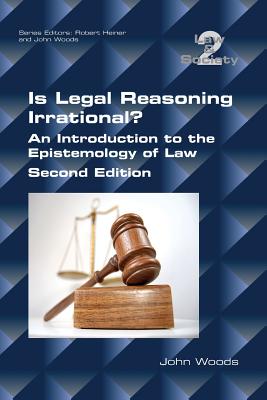Is Legal Reasoning Irrational? An Introduction to the Epistemology of Law: Second Edition

Is Legal Reasoning Irrational? An Introduction to the Epistemology of Law: Second Edition
Philosophy and the law share an interest in a good many of the same concepts. Some of these are moral and political ideas, such as justice, rights and freedoms, duty, responsibility, guilt and innocence, and punishment. Others are of a more epistemological and logical character - for example, proof, truth, evidence, justification, truthfulness, reasoning, decision-making and argument, judgement, certainty, probability, relevance, and others. Most undergraduate texts in the philosophy of law focus on the moral and political concepts, and have little to say about the epistemological ones. Is Legal Reasoning Irrational? is a significant departure from that norm. While far from stinting on moral and political notions, it gives sustained attention to the epistemological and logical issues that arise in all legal contexts, but especially in trials at the bar of justice. It is only natural to ask how will legal reasoning and decision-making stack up to the performance standards mandated by mainstream epistemologists and logicians. As the title of the book indicates, the law doesn't measure up at all well. When a theory says that human beings are acting irrationally, two things are possible. One is that the fault lies with us humans. The other is that theory has got the standards of human rationality wrong. Perhaps it is not customary in an introductory textbook to advance philosophical theses of the author's own. Is Legal Reasoning Irrational? is also a point of departure from that custom. In the case of legal reasoning and judgement, I argue that the established philosophical standards of rationality are the culprit, not the legal system itself. The book is suitable for undergraduate use in introductions to the philosophy of law, either as the main text or supplementary reading. The author holds the Honorary Professorial Chair of Logic at the University of British Columbia and is President Emeritus and Adjunct Professor of Philosophy at the University of Lethbridge.
PRP: 181.87 Lei
Acesta este Prețul Recomandat de Producător. Prețul de vânzare al produsului este afișat mai jos.
145.50Lei
145.50Lei
181.87 LeiIndisponibil
Descrierea produsului
Philosophy and the law share an interest in a good many of the same concepts. Some of these are moral and political ideas, such as justice, rights and freedoms, duty, responsibility, guilt and innocence, and punishment. Others are of a more epistemological and logical character - for example, proof, truth, evidence, justification, truthfulness, reasoning, decision-making and argument, judgement, certainty, probability, relevance, and others. Most undergraduate texts in the philosophy of law focus on the moral and political concepts, and have little to say about the epistemological ones. Is Legal Reasoning Irrational? is a significant departure from that norm. While far from stinting on moral and political notions, it gives sustained attention to the epistemological and logical issues that arise in all legal contexts, but especially in trials at the bar of justice. It is only natural to ask how will legal reasoning and decision-making stack up to the performance standards mandated by mainstream epistemologists and logicians. As the title of the book indicates, the law doesn't measure up at all well. When a theory says that human beings are acting irrationally, two things are possible. One is that the fault lies with us humans. The other is that theory has got the standards of human rationality wrong. Perhaps it is not customary in an introductory textbook to advance philosophical theses of the author's own. Is Legal Reasoning Irrational? is also a point of departure from that custom. In the case of legal reasoning and judgement, I argue that the established philosophical standards of rationality are the culprit, not the legal system itself. The book is suitable for undergraduate use in introductions to the philosophy of law, either as the main text or supplementary reading. The author holds the Honorary Professorial Chair of Logic at the University of British Columbia and is President Emeritus and Adjunct Professor of Philosophy at the University of Lethbridge.
Detaliile produsului









